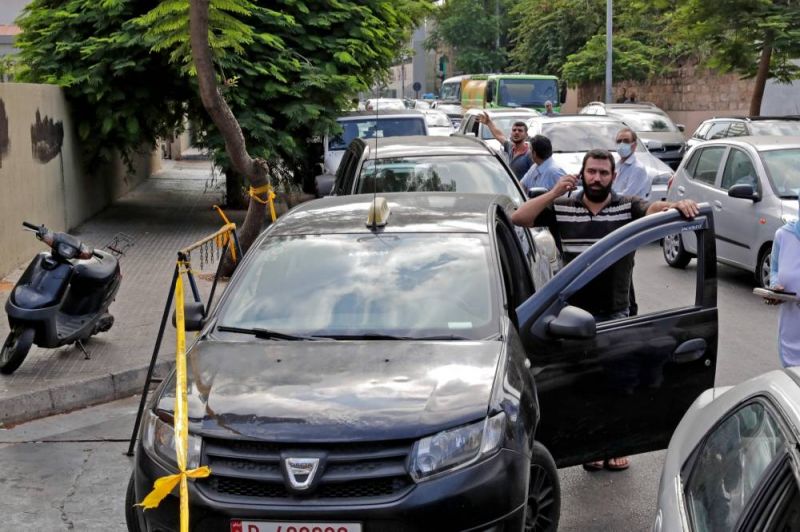
Long queues, like this one outside a closed Hamra gas station, have become a common sight in Lebanon as motorists wait in hope of being able to fill their tanks. (Credit: Anwar Amro/AFP)
Want to get the Morning Brief by email? Click here to sign up.
Fuel will be subsidized using a new exchange rate of LL8,000 to the dollar — at least for the next few weeks. Following a meeting with the central bank governor and caretaker finance and energy ministers on Saturday evening, President Michel Aoun and caretaker Premier Hassan Diab gave their “exceptional approval” to partially remove fuel subsidies. According to the agreement, fuel imports will now be financed at an exchange rate of LL8,000 to the US dollar, instead of LL3,900. The country’s top officials capped the funding for this new subsidy rate at $225 million until the end of September, with the state expected to pay back the allocation in 2022. The decision partially walks back Banque du Liban’s Aug. 11 announcement that it would completely end fuel subsidies as it could no longer finance fuel imports without dipping into its mandatory reserves — 14 percent of commercial banks’ dollar deposits that must be kept at BDL to safeguard the financial sector.
The Energy Ministry announced a sharp increase in fuel prices yesterday in alignment with the compromise on subsidies. The price of 20 liters of 98-octane gasoline rose by 67 percent to LL133,200, 95-octane increased by 66 percent to LL129,000 and diesel jumped by 74 percent to LL101,500. The cost of household cooking gas cylinders meanwhile rose by 54 percent to LL90,400. The hikes represent yet another painful increase in the price of fuel, which has gone up by 396 percent for gasoline and 452 percent for diesel since the beginning of this year. The head of the land transport unions, Bassam Tleiss, told our sister publication L’Orient Le Jour that public transit fares would rise to between LL16,000 and LL20,000. The General Directorate of Oil said existing stocks of fuel must still be sold at the old subsidy rate of LL3,900 to the dollar until they run out, but importers and gas stations have resisted such mandates recently, in case the price rises again in the near future.
Meanwhile, with severe fuel shortages still paralyzing the country, Hassan Nasrallah last night said a second shipment of fuel would set sail “within days” from Iran to Lebanon. The Hezbollah chief added that a first fuel shipment, namely of diesel, announced on Thursday had already left Iran. He also said that further shipments would follow but insisted Hezbollah was not trying to step into the state’s shoes by purchasing fuel. “We are not taking the place of the state, nor are we an alternative to companies that import fuel,” he said. Following the announcement of the initial Iranian shipment last week, the US said it is working with regional powers to secure natural gas or already produced electricity for Lebanon. However, the viability of both schemes and the likelihood of either making a significant and timely impact on the ground in Lebanon remains in question.
More than 4 million people in Lebanon risk losing access to safe water, the United Nations Children’s Fund (UNICEF) warned on Saturday. The organization’s executive director, Henrietta Fore, sounded the alarm about access to safe, drinkable water for the second time in as many months. “If 4 million people are forced to resort to unsafe and costly sources of water, public health and hygiene will be compromised, and Lebanon could see an increase in waterborne diseases, in addition to the surge in COVID-19 cases,” she said. At the end of July, the UN agency warned that the energy crisis threatened to shut down water pumping stations across the country.
Four more people died over the weekend from injuries sustained in the Akkar fuel tanker explosion on Aug. 15. The explosion, which occurred when an illegally stockpiled fuel tanker ignited, continues to claim lives more than a week later. The Health Ministry announced on Saturday that to date it could confirm the deaths of 30 people in the blast; however, a ministry source told L’Orient Today that this count does not include as yet unidentified human remains and those still missing following the explosion. Similarly to the Aug. 4, 2020 Beirut port explosion, politicians have called for investigations into the circumstances of the explosion but no one in a position of authority has been held accountable for the fuel crisis that has resulted in dangerous hoarding and smuggling.
Investigating Judge Tarek Bitar will interrogate Camille Daher and Jean Kahwaji this week in connection with the Aug. 4, 2020 Beirut port explosion. Brig. Gen. Daher is a former head of Army Intelligence, while Gen. Kahwaji is a former head of the army. The investigation into the port blast has stretched on for more than a year, with no end in sight. No one has yet been held accountable for the disaster that killed more than 200, wounded thousands and damaged large parts of the capital.